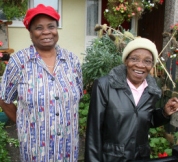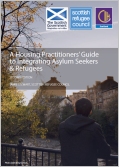Contents:
The Housing (Scotland) Act 1987 is the main framework for housing allocations and the provision of homelessness services in Scotland.
Housing allocations
Section 19 (1) of the act (as amended) establishes that anyone aged 16 or over has a right to be admitted to a housing list. The allocation of housing, however, is governed by further rules:
- By section 20 reasonable preference must be given to certain people in housing need.
- However, the Immigration and Asylum Act 1999, s118(1) prohibits a local authority from granting a tenancy to any person who is ‘subject to immigration control’ unless that person falls within a class specified in an order made by the Secretary of State.
This means that a person who is 'subject to immigration control' cannot be given a local authority tenancy unless s/he is in a class that has been reincluded as eligible by The Persons subject to Immigration Control (Housing Authority Accommodation and Homelessness) Order 2000 (pdf).
Homelessness services
Part II of the Housing (Scotland) Act 1987 (as amended) sets out the powers and duties of local authorities in dealing with applications from people seeking help on the grounds that they are homeless or threatened with homelessness.
The Immigration and Asylum Act 1999, s119 (as amended from 1 January 2021, by SI 2020 No 1309 Reg 12(8)) applies to applications for homelessness assistance in Scotland. Assistance is barred to anyone who is ‘subject to immigration control’ (which has the same meaning as in s118) unless that person falls within an eligible class specified by the Order (pdf). By the same section if the applicant is ‘subject to immigration control’ and falls within an eligible class, but a member of his/her household does not, then that ineligible member is disregarded by the authority when deciding whether the applicant is homeless: see applications by mixed families for further details.
Who is ‘subject to immigration control’?
For these purposes a person is ‘subject to immigration control’ if s/he ‘is a person who under the 1971 Act requires leave to enter or remain in the UK (‘whether or not such leave has been given’ (Immigration and Asylum Act 1999, s118(6)). From 1 January 2021, every person requires leave to enter or remain in the UK unless s/he is:
- a British citizen (Immigration Act 1971, s.2(1)(a))
- an Irish citizen (with certain exceptions) (Immigration Act 1971, s.3ZA); or
- a Commonwealth citizen with the right of abode (Immigration Act 1971, s.2(1)(b)).
Before 1 January 2021, an EEA national who was exercising one of his/her free movement rights was not ‘subject to immigration control’ (Immigration Act 1988, s.7(1), repealed by Immigration and Social Security Co-ordination (EU Withdrawal) Act 2020, schedule 1 para 1). But EEA nationals and EEA family members who were lawfully present in the UK before 1 January 2021 have preserved rights until their application to the EU Settlement Scheme is finally determined (provided they applied on or before the 30 June 2021 deadline), or after then if they have been granted EU pre-settled status.
Eligible classes
The order, as amended, allows the following classes of people to be made an allocation of housing or offered accommodation as homeless:
- Class A - a person recorded by the Secretary of State as a refugee within the definition in Article 1 of the Refugee Convention.
- Class B - a person:
(i) who has been granted by the Secretary of State exceptional leave to enter or remain in the United Kingdom outside the provisions of the immigration rules; and
(ii) whose leave is not subject to a condition requiring him to maintain and accommodate himself, and any person who is dependent on him, without recourse to public funds. - Class BA - a person who has humanitarian protection granted under the immigration rules.
- Class BB – a person who has been granted limited leave (‘temporary permission to stay’ (TPS)) under the immigration rules as a victim of human trafficking or slavery. Before 30 January 2023 people recognised as survivors under the National Referral Mechanism were granted leave outside the rules and would then be eligible under Class B.
- Class C - a person who has current leave to enter or remain in the United Kingdom which is not subject to any limitation or condition and who is habitually resident in the Common Travel Area, other than a person:
(i) who has been given leave to enter or remain in the United
Kingdom upon an undertaking given by another person (his 'sponsor') in writing in
pursuance of the immigration rules to be responsible for his maintenance and
accommodation;
(ii) who has been resident in the United Kingdom for less than five years
beginning on the date of entry or the date on which the undertaking was given in respect of
him, whichever date is the later; and
(iii) whose sponsor or, where there is more than one
sponsor, at least one of whose sponsors, is still alive.
- Class D - a person who left the territory of Montserrat after 1st November 1995 because of the effect on that territory of a volcanic eruption.
- Class FA – from 6 July 2018, unaccompanied ‘Dubs children’ (pdf) stranded in Europe, and their dependants, get leave via section 67 of the Immigration Act 2016.
- Class FAA – from 22 March 2022, a person who was residing in Ukraine before 1 January 2022, who left due to the Russian invasion and who has leave without a ‘no public funds’ condition. This includes, but is not limited to, a person who has a Ukraine Family Scheme or a Ukraine Sponsorship Scheme visa.
- Class FAB – from 10 June 2022, a person from Ukraine who was granted limited leave without a ‘no public funds’ condition whist in the UK (e.g., as a work permit holder) under the Ukraine Extension Scheme.
- Class FB – from 24 August 2020, a person who is the family member of a ‘relevant person of Northern Ireland’, who has been granted EU pre-settled status provided that the ‘person of Northern Ireland’ they accompany is an EU worker, retained worker, or self-employed person (or would be but for the fact s/he is not a EU national).
- Class FC – from 24 August 2018, a person who has been granted limited leave as a stateless person.
- Class FD – from 16 September 2021, a person who left Afghanistan:
- who was previously employed by the British armed forces and who has been granted leave under the immigration rules by virtue of the Afghan Relocations and Assistance Policy (ARAP) or the Afghan Locally Employed Staff ex-gratia scheme (ALES), or
- who has been granted leave outside the immigration rules under the Afghan Citizens Resettlement Scheme (ACRS) unless that leave has a ‘no public funds’ condition or was given upon an undertaking by a sponsor (unless their sponsor(s) have died).
- Class FE – from 6 April 2022, a person who has limited leave to enter or remain in the UK on family or private life grounds under Article 8 of the Human Rights Convention, whose leave is not subject to a ‘no public funds’ condition.
- Class FF– from 6 April 2022, a person who has ‘Calais leave’ (i.e. arrived to join his/her family in the UK after being cleared from the Calais camps in 2016-17) who is habitually resident in the Common Travel Area.
- Class FG– from 06 April 2022, a person from Hong Kong who has limited leave as a British National (Overseas) who has applied for, and been granted, access to public funds and who is habitually resident in the Common Travel Area.
- Class FH – from 15 April 2023, a person who was resident in Sudan before 15 April 2023 and who has been granted leave without being sponsored and and who has been granted access to public funds.
- Class FI – from 27 October 2023, a person who was residing in Israel, Palestine, Lebanon or the occupied territories immediately before 7 October 2023 who left in connection with the Hamas terror attack or the violence that followed and who has been granted leave without a sponsor and with access to public funds (Class Q).
The order also allows allocations to be made to existing secure tenants and to students occupying hard-to-let accommodation under special arrangements, and homelessness accommodation to be provided to certain asylum seekers who made applications before April 2000 (none of whom appear to now exist).
European (EEA) nationals and family members who arrived before 1 January 2021
Before 1 January 2021, an EEA national and an EEA family member who was exercising one of his/her free movement rights did not require leave to enter or remain in the UK and so was not ‘subject to immigration control’ (See Immigration and asylum Act 1999, s.118(6), 119(4) and Immigration Act 1988, s.7(1), repealed by Immigration and Social Security Co-ordination (EU Withdrawal) Act 2020, schedule 1 para 1).
An EEA national or EEA family member who was lawfully resident in the UK before 1 January 2021 and who applied to the EU Settlement Scheme on or before 30 June 2021 continues to be treated as ‘not subject to immigration control’ at least until their application is finally determined (SI 2020 No 1209, Regs 4 and 12(1)(g),(2)) and after then for as long as s/he has EU pre-settled status (SI 2020 No 1309, schedule 4 paras 1, 2, 3(e)). The same applies to a family member who accompanied them (including, in some cases, a family member who arrived after 1 January 2021). The same protection applies to EEA nationals/EEA family members who have made a late application to the EU Settlement Scheme, provided their late application has been accepted (SI 2020/1209 Regs 4, 12).
The preserved rights to reside (as modified by SI 2020 No 1309, schedule 4 para 4) are described on the pages for EEA workers, other EEA nationals and EEA family members as appropriate.
The effects of the EU Settlement Scheme
All EEA nationals living in the UK and all people with EU rights to reside (including family members of EEA nationals and ‘Zambrano’ carers’) can apply to the EU Settlement Scheme and can do so until 30 June 2021.
Successful applicants who can prove they have lived continuously in the UK for five years get ‘EU settled status’. Those who can prove residence for shorter periods get ‘EU pre-settled status’ and can later apply to convert this into EU settled status. Both kinds are granted under the Immigration Rules.
Once a person has been granted EU settled status s/he can no longer make use of their EU free movement rights in the UK to get access to housing and benefits. But EU settled status is indefinite leave with no conditions so a person who has it is in eligible Class C for housing and homelessness services so, s/he is not disqualified as a ‘person subject to immigration control’ for either housing or homelessness purposes.
EU pre-settled status is limited leave and does not fit into any eligible classes for housing and homelessness services. But a person with pre-settled status can continue to use their free movement rights (as modified) to qualify for housing or homelessness services (SI 2020 No 1309, schedule 4 paras 1, 2, 3(e)), for up five years after 30 June 2020, until s/he qualifies for EU settled status. So as long as a person with pre-settled status continues to meet the conditions for an EEA right to reside, including being a jobseeker or Zambrano carer s/he is not ‘subject to immigration control’ and qualifies for housing or homelessness services. But EU pre-settled status on its own is not sufficient, it must be used in conjunction with an EU right to reside.
Homelessness applications by 'mixed' families
If an application is made by a household where one member (or more) is eligible but one or more of their household members is not, two possibilities arise:
- If the eligible applicant is subject to immigration control (i.e. falls within one of the classes reincluded as eligible above) s/he cannot rely on the ineligible household member(s) to be considered as homeless (Immigration and Asylum Act 1999 s119(1),(1A) as amended by SI 2020 No 1309, Reg 12(8)). In other words, the ineligible household member is disregarded as being part of the application.
- If the eligible member is not subject to immigration control (i.e. usually a UK or an EEA citizen who lawfully resided in the UK before 1 January 2021), then the ineligible member is a ‘restricted person’ and a special procedure applies to these types of application.
In the second instance if the applicant is only defined as homeless due to the presence of a restricted person, and is then accepted as homeless, then s/he is likely to be made an offer of private rented accommodation for at least 12 months (although an offer of social housing can be made). Once the offer is made the duty is discharged whether or not the applicant accepts it (Housing (Scotland) Act 1987, s31), provided that s/he has been informed of:
- the possible consequence refusing it, and
- his/her right to request a review.
You can find more information on the page about mixed households.
More information
The Scottish Government publishes a web-based practice guide on allocations (revised in 2019) which is aimed mainly at local authorities and other social landlords. The COSLA Strategic Migration Partnership also has a toolkit for local authorities on establishing migrants’ access to benefits and public services.
The Scottish Code of Guidance on Homelessness was updated in 2019. However, it no longer covers eligibility according to immigration status but refers instead to the COSLA guide on Migrants' Rights and Entitlements.




